An interview with my better half on the money-side of things. It's taboo. We argued a lot over the post on what to share and what to keep confidential, but in the end our hope is that this helps you when planning your dream trip. It's the first interview in our newest series. Now over to Josh.
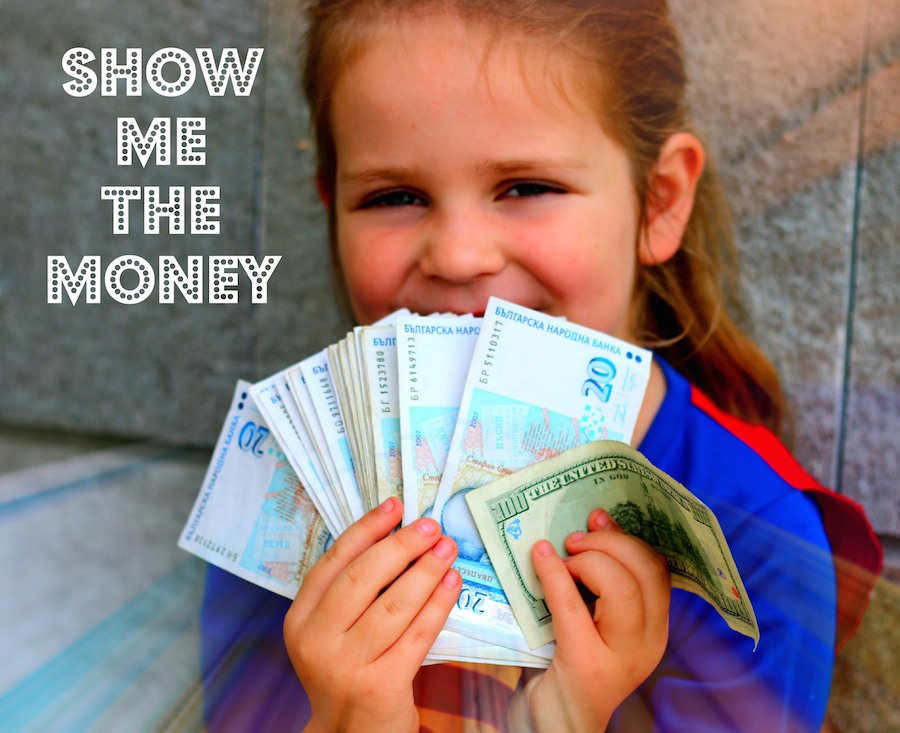
How much money was in your pocket/wallet/bank account when you started on your travel adventure? And how did you decide that was enough to get started?
When we left Australia in May 2012 we had saved around AUD$15,000 (US$15k at the time). This was a buffer so in case anything went wrong there would be enough to travel back to Perth, Australia. But fortunately we have never even considered using it for that purpose along our journey.
I was perfectly fine flying off with just a couple weeks spending money saved up but Erin wanted a bit more certainty at the time. As we’ve travelled I think she’s become more comfortable with less certainty and more spontaneity.
For daily spending money held the funds in a savings account, and withdrew cash from ATMs as we went along. For larger expenses such as supermarket purchases, flights and accommodation we usually used an Australian credit card or Paypal.
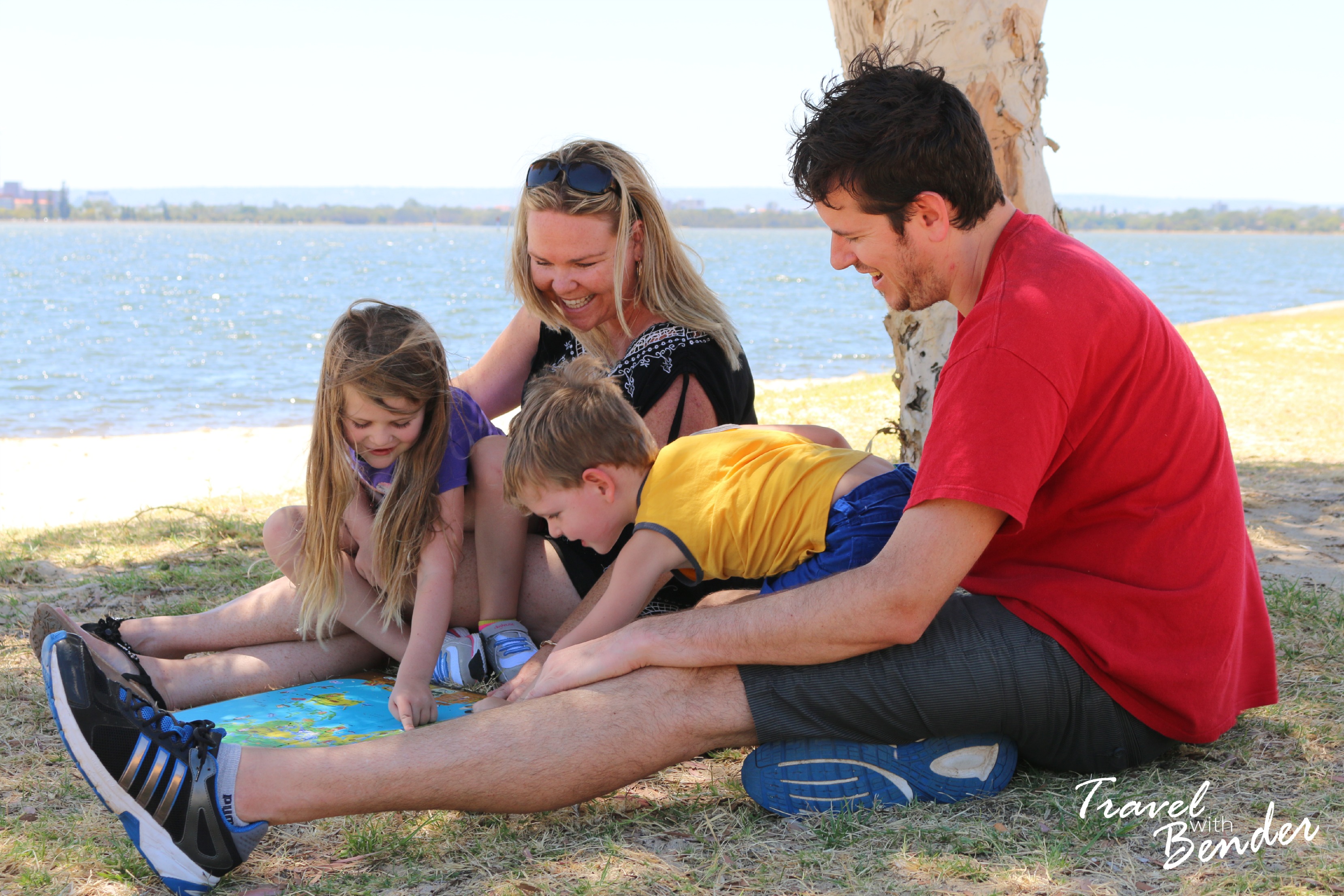
What methods do you currently use to make money while you travel (in order of most value)?
When we left Australia I owned a web design and online marketing business that had been running for 7 years to that point. It was bringing in a decent middle-class income, but high taxes and the high cost of living in Australia ate into our spending power. The more we travelled the less time I spent on the business and the income did decline. But by 12 months into our journey I was working around 90% less than I was in Australia, but income had only lowered by about 30%. I had trained other staff by that point to carry much of the day-to-day responsibility of the business. It was a much better lifestyle and a lot less stress.
I’ve been involved in web development since 1998 and realized soon after establishing my own business in 2005 that it was easy to manage from anywhere in the world. I just needed a laptop and Internet connection. Most of clients I dealt with communicated with me via phone and email. So that was relatively easy to transition to a location-independent business. Making phone calls from different timezones was the biggest challenge (particularly from the US to Australia, during Australian business hours).
In November 2013 the web design business was acquired by a new owner, so I now have more time to spend on TravelWithBender.com and get new businesses off the ground.
I’ve also operated a software business for a few years which sells website components in a marketplace for other developers or folks who want to build their own website. That brings in around AUD$1,500 profit per month on average.
As you've travelled the world and met other travellers, what is the most unusual way you've heard of other people creating an income on the road?
It never ceases to amaze me the sheer variety and creativity in which other travellers make money. I’m always impressed to see travellers making money from blogging, as I know that isn’t easy. If you want to write a blog, go for it, but don’t do it to get rich.
We met a girl who takes family portraits and uses the money to cover her expenses as she travels. That is a clever and simple way to make money. Another person was a voice actor which is something a bit more out-of-the-box.
Turner from Around the World in 80 Jobs, always finds himself in the most unusual and amusing places and still makes money along the way. So that is the other end of the scale.
The most unusual income came from an American we met in Bath, United Kingdom who was selling Star Wars collectables online in substantial volume. I never thought of that before!

How much do you spend (on average) each month?
These amounts fluctuate a fair bit depending on which country we’re in, sometimes by 50% or more. Naturally countries like Australia are far more expensive than Thailand. In fact we usually spend two thirds less then what we did in Australia. These are averages across the board.
Flights/transport: US$0 to $1,200
Accommodation: US$900 to $1,800 (usually includes wifi, cable, electricity, gas, water and cleaning)
Food: US$500 to $1000
Tours & Entertainment: US$100 to $400
Miscellaneous: $100 (this includes clothes and gifts)
Mobile/communication: US$0 to $100
Total outgoing expenses: US$2,500 to US$6,000 - Usually sits around $3000
What have been the ways that you've saved the most amount of money?
We started housesitting in the last 12 months and found that to be a really handy way to save on accommodation costs. Erin saw other travellers using various housesitting agencies so we gave it a shot and had a couple great experiences, so it’s something we’re looking to do more of.
We have written a post about ways to save money booking flights. These are one of our biggest expenses, so we are mindful about keeping those as low as possible. In some cases we would even stay in a city a day or two longer in order to nab a cheaper flight, and the extra accommodation costs still works out in our favour in the end.
Depending on how long we spend in a particular town, our eating habits change. If we’re staying in one spot for at least 2 weeks we will usually go to a supermarket and load up on food – particularly for breakfast and lunch. Then often eat out at dinnertime. In saying that, some countries and cities work out cheaper eating out then actually cooking your own food.
Another handy cost-saving tip when staying in a country for more than 2 weeks is to buy a local SIM card. Usually overseas roaming fees from your mobile carrier back home will be much higher than usual a local mobile carrier. And now, we often go for months at a time without a SIM card at all, and just rely on Skype for making phone calls. Getting your own landline number with Skype makes it easy for anyone to call you wherever you are in the world. You can even register multiple numbers from different countries if it suits your circumstances better.
What's things have been the biggest waste of money for you?
Erin has a shocking track record of dropping and breaking her iPhone. We were often paying up to $100 per repair job, depending on which country we were in. But to add salt to the wound, we had it repaired last year and just a week later it was pick-pocketed from us in Guatemala. That was a gut-wrenching experience. Since then, we’ve been extra cautious with our phones and I’ve also bought Erin a tough phone case. It’s never been damaged since then.
What is the best money generation/management tip that you read/heard that impacted your life?
I learned from an early age to manage money wisely and create a budget, thanks to my father. That is a valuable life skill needed just to be a successful person, let alone travel.
The 10/10/80 rule for managing money also provides a healthy perspective on spending, which I attribute to my father-in-law. 10% of income is for donation, 10% for savings, and then live off the other 80%.
Before we started travelling full-time I was very focused on money, and was working long hours in my business. The best money management tip I’ve learned is to place so much less importance on currency. You won’t leave this earth with it – but your memories and relationships will echo into eternity. For me, travelling has naturally fit into a minimalistic lifestyle. It has helped me loosen my consumerist grip on accumulating “stuff”, and instead I now accumulate experiences. As much as I don’t like it, money is needed for living in this world, but the less power I have chosen to give it, the less power it has over me. The photo below I took of street art in Jerusalem sums it up perfectly.
Very few people will tell you this because it’s in their best interest for you to buy into the “Australian dream” (or “American dream"). But when you sit down and work out how much time you spend in a “job”, away from your family and loved ones, just to pay the bills and keep up with the Jones, it really calls into question the purpose of a "job". I know it did for me. So I made a conscious decision to simplify our lives and travelling made that process easier. In doing so fear has been shed. Now I feel much freer, and can spend more quality time with the people that mean the most to me – Erin, Mia and Caius. After all, that's what life is all about.
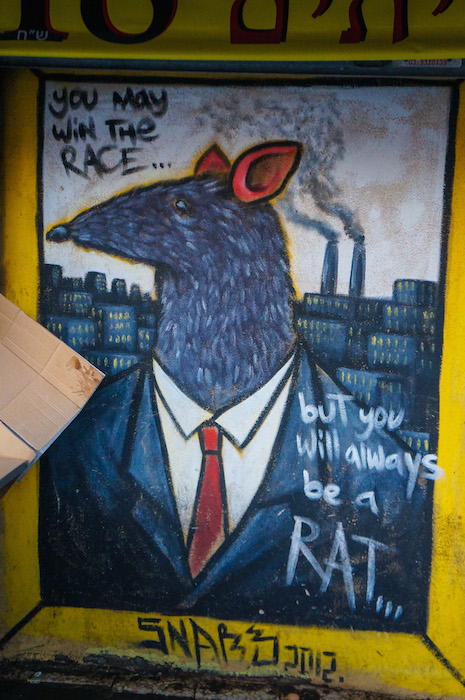
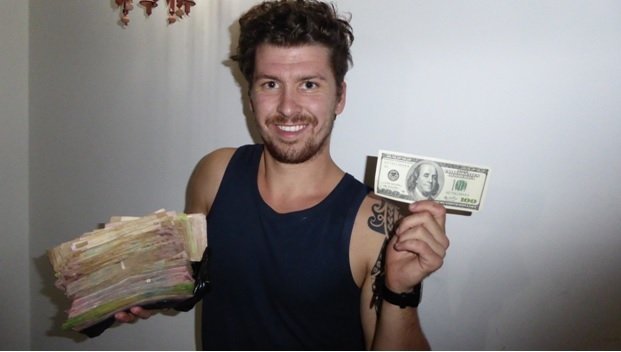
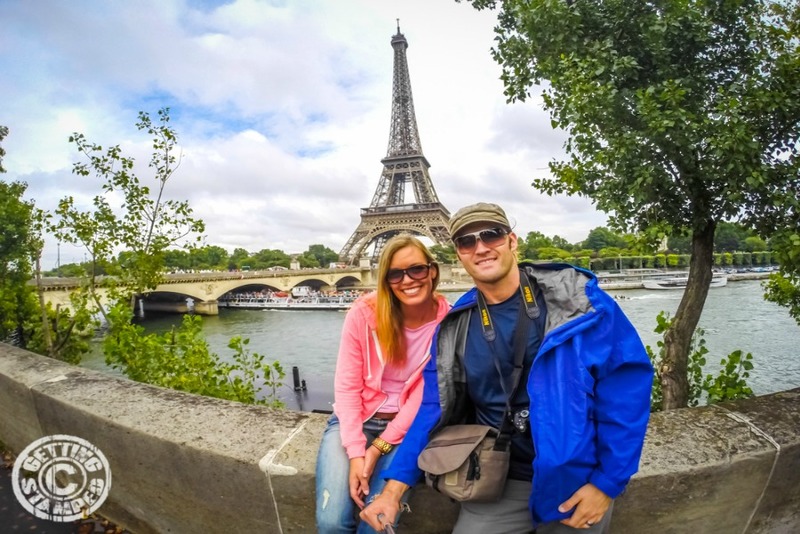
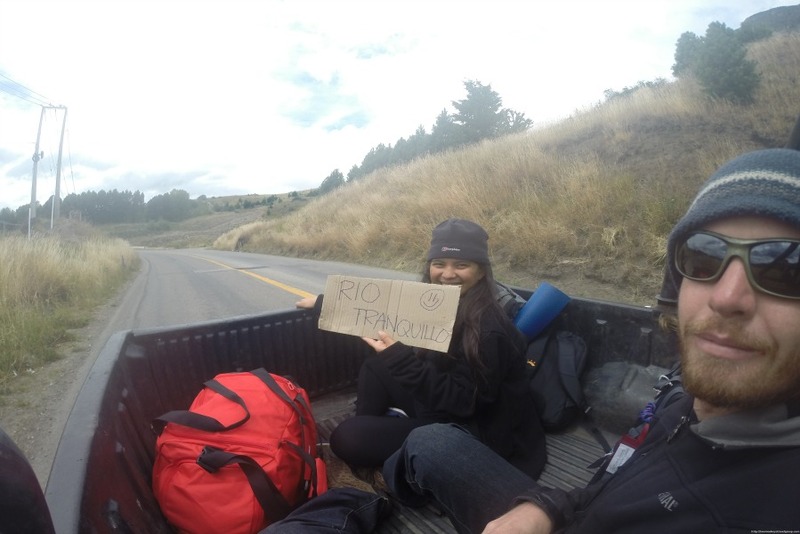
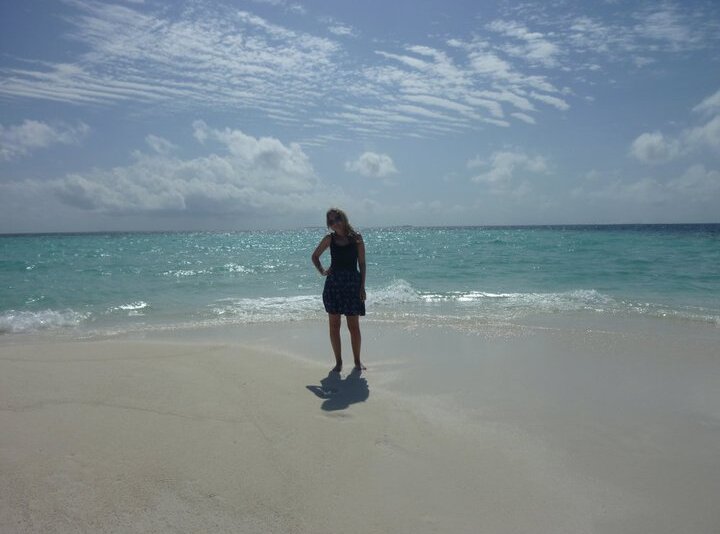
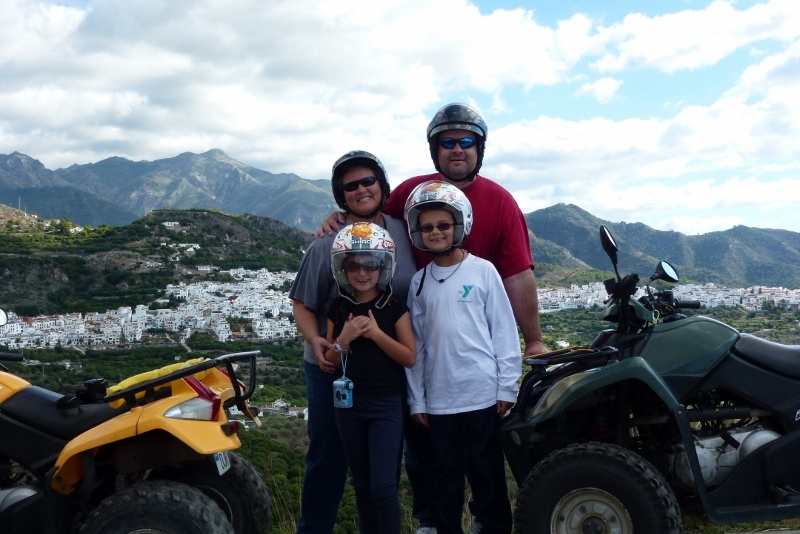

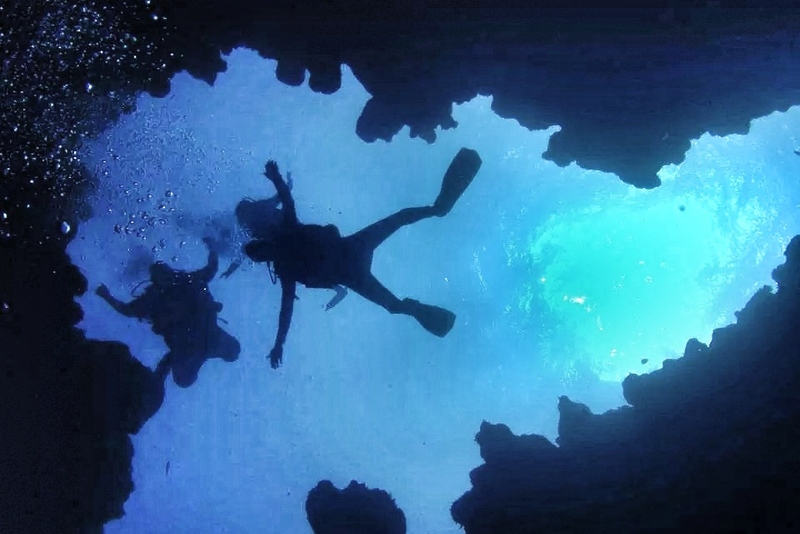



Reader Comments...
"I respond to every comment by direct private email. I look forward to your feedback" - Josh BenderHmm interesting read
This was an awesome read guys!! Well done :)
Love this post!! Thanks guys x
Great post, Erin & Josh. Thanks.
love it. great post. thanks guys
That is really inspiring! Thanks so much!
I like your outlook on the rat race and minimalism. I just finished reading a book by Blake Mycoskie, the guy who founded Toms. He said it's better to get rid of everything and get down to the basics, then slowly and thoughtfully add things to your life if they serve a purpose. But most people buy things that the Jones' have and hope these things will result in a happy life.
Great article we are finding moneywise it is much cheaper moneywise travelling than being at home in Perth too but the quality of our lives is so much better :-)
I love this post guys. It is often difficult to talk about the money aspects of traveling, but funnily enough it is the one things that most want to know about. Well done on being raw and honest about your situation. One we can relate to ourselves. It is so easy to get caught up in the 'real' world of consumerism, but deciding to leave it behind and live a life uncommon is the most scary but freeing thing I believe any human can do. And you guys have proved that. Congratulations on living a life uncommon, and more importantly teaching your children to do the same. And that is something very inspiring to me xx
Hi Josh and family,
Nat Smith (above) said everything I felt after reading this post.
What I will add though, is that for this woman of 60 years, living a nomadic family life is something completely impossible 40 years ago. The internet has changed all that. Enterprising people and families like yours have this awesome opportunity to get out there and see the world. Words simply cannot express how fabulous that is.
Aren't you glad you are alive in this time?
Josie
Thanks for sharing. We are a family with two children and we like a few luxuries too, the way you travel seems to resonate with us. We are streamlining our business at the moment, after the hard slog we are letting go and relying on others to take the reigns. I agree with your sentiments about living life but still having a buffer. Hope to meet you on the road one day!
Loved the article. We chose the expat route and "retired" early last year to Costa Rica, instead of constant travel. We started funding our adventure by simplifying our bloated lifestyle and living on less - we live on about a quarter of what we lived on in the States; I would not trade it. Now we are trying to replace the savings we are spending each month. We: housesit, wife makes bracelets that bring in a couple hundred$, we freelance write and make about $4 a month from our blogs. Hey, it's a start. I look forward to this series.
Thanks Erin and Josh, you helped to inspire our very successful move to Malaysia, and my husbands early retirement. I, like Josh, can still work online. The Internet is an amazing tool, I think we are so lucky to be the first generation able to use this tool and let go of physical boundaries in the work place. Keep inspiring and happy travels, love to catch up at Miami Green one day.
Love your story! We follow very much the same philosophy - being minimalistic and enjoying life to the fullest. We left the "American Dream" in 2007 and started to live OUR dream instead. Much better experience! Hope to run into you guys again soon one day! Cheers - Cheryl and Lisa
I love the perspective that you put on money - yes, we need it to get by int his world, but it is the amount of importance you choose to give to it. Love this!
So great to read this, especially the family posts. And a great reminder about the 10,10,80 method, we were given this advice pre marriage and it has served us well :) We have recently moved interstate to save $ on bills and expenses that came with living in sydney and would love to travel more as a family & with my husband also a web designer was great to see how you are practically managing. Love to hear more about your homeschooling experience on the road too. I guess its only a couple of hours a day, but do you do it all online or carry books with you? A post on raising kids on the road next maybe ?? ;) cheers x kat
Any tips on schooling?
Write Your Comment
Please DO NOT include links, URLs or HTML in your comments - they will be automated deleted and you will waste your time.